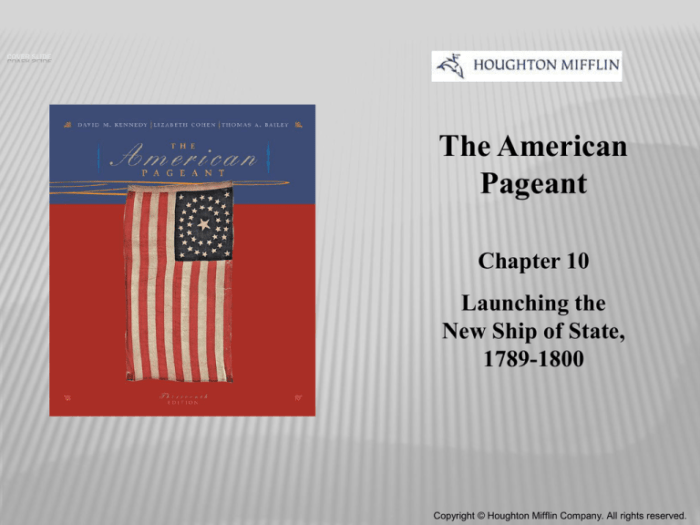American pageant chapter 30 notes – Embark on an enlightening journey through American Pageant Chapter 30, where we delve into the intricacies of American imperialism, its profound impact on society, and its enduring legacy in foreign policy.
This chapter explores the factors that propelled the United States onto the world stage, the diverse territories it acquired, and the consequences of its expansionist endeavors both domestically and internationally.
Overview of American Pageant Chapter 30
Chapter 30 of American Pageant provides an overview of the rise of American imperialism and its impact on the nation’s society, foreign relations, and culture. The chapter covers the historical events leading to the expansion of American power overseas, including the Spanish-American War and the acquisition of overseas territories.
It also explores the debate over imperialism and its legacy in American foreign policy.
The Rise of American Imperialism
The late 19th century witnessed the rise of American imperialism, a period marked by the expansion of American power and influence overseas. Several factors contributed to this expansion, including economic growth, industrialization, and a desire for new markets and resources.
The United States acquired new territories through a variety of means, including purchase, annexation, and military conquest.
Impact of Imperialism on American Society and Foreign Relations
Imperialism had a profound impact on American society and foreign relations. It led to increased national pride and a sense of superiority, known as jingoism. The expansion of American control overseas also brought the United States into conflict with other nations, including Spain and Germany.
The Spanish-American War

The Spanish-American War of 1898 was a watershed moment in American history. The war, which began over the issue of Cuban independence, resulted in the United States acquiring control of Puerto Rico, Guam, and the Philippines. The war also marked the end of Spanish colonial rule in the Americas.
Role of the United States in the Conflict
The United States played a decisive role in the Spanish-American War. The American navy destroyed the Spanish fleet in the Battle of Manila Bay, and American troops quickly defeated the Spanish forces in Cuba.
Consequences of the War
The Spanish-American War had a profound impact on both the United States and Spain. For the United States, the war led to the acquisition of new territories and a newfound sense of global power. For Spain, the war marked the end of its colonial empire.
The Acquisition of Overseas Territories

During the late 19th and early 20th centuries, the United States acquired a number of overseas territories, including Puerto Rico, Guam, the Philippines, and Hawaii. These territories were acquired for a variety of reasons, including strategic military importance, economic opportunities, and a desire to spread American values and influence.
Challenges and Benefits of Expanding American Control Overseas
Expanding American control overseas brought both challenges and benefits. The United States faced challenges in governing and defending its new territories, and it also faced criticism from anti-imperialists who argued that imperialism was a violation of American principles. However, the United States also benefited from its overseas territories, which provided access to new markets, resources, and military bases.
The Impact of Imperialism on American Culture: American Pageant Chapter 30 Notes
Imperialism had a significant impact on American culture. It led to the rise of jingoism and the spread of American values abroad. It also influenced American race relations, as the United States acquired territories with diverse populations.
Rise of Jingoism and Spread of American Values, American pageant chapter 30 notes
Imperialism contributed to the rise of jingoism, a belief in the superiority of one’s own country and a willingness to use military force to defend its interests. It also led to the spread of American values abroad, as the United States sought to impose its own political and economic systems on its new territories.
Impact on Race Relations
Imperialism also had a significant impact on race relations in the United States. The acquisition of territories with diverse populations led to debates about the rights of non-white peoples. These debates would continue to shape American race relations for decades to come.
The Debate over Imperialism
The debate over imperialism was a major issue in American politics during the late 19th and early 20th centuries. Anti-imperialists argued that imperialism was a violation of American principles and that it would lead to war and corruption. Imperialists, on the other hand, argued that imperialism was necessary to protect American interests and to spread American values abroad.
Legacy of Imperialism in American Foreign Policy
The debate over imperialism continues to shape American foreign policy today. Some argue that the United States should continue to intervene in the affairs of other countries to promote democracy and human rights. Others argue that the United States should focus on its own domestic affairs and avoid foreign entanglements.
FAQs
What were the main causes of American imperialism?
Economic expansion, geopolitical competition, and a sense of national destiny.
How did the United States acquire its overseas territories?
Through war, purchase, and annexation.
What were the consequences of the Spanish-American War?
The United States emerged as a global power, acquired new territories, and faced new challenges in managing its empire.
How did imperialism impact American culture?
It fostered a sense of national pride, spread American values abroad, and contributed to racial tensions within the United States.
